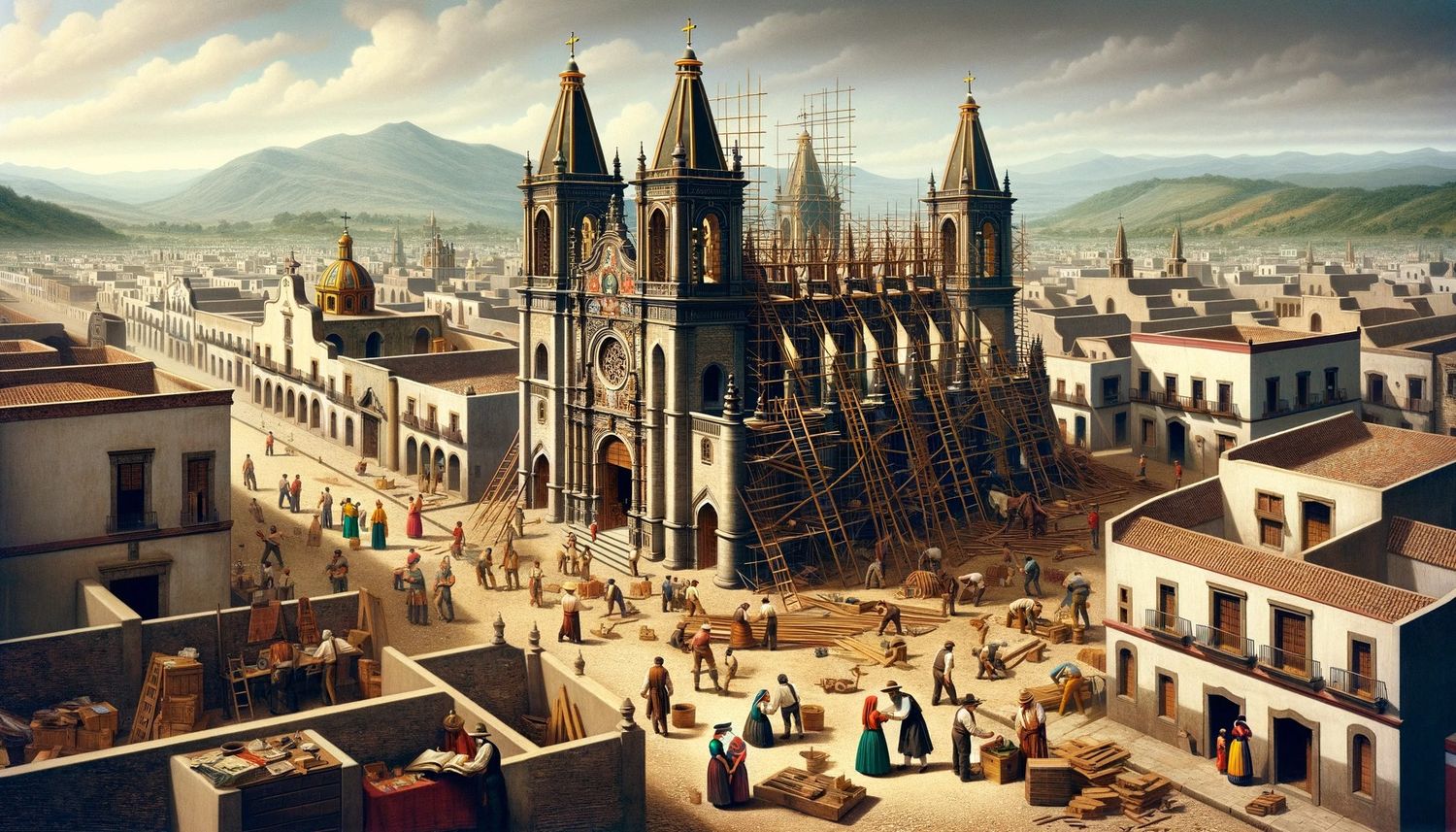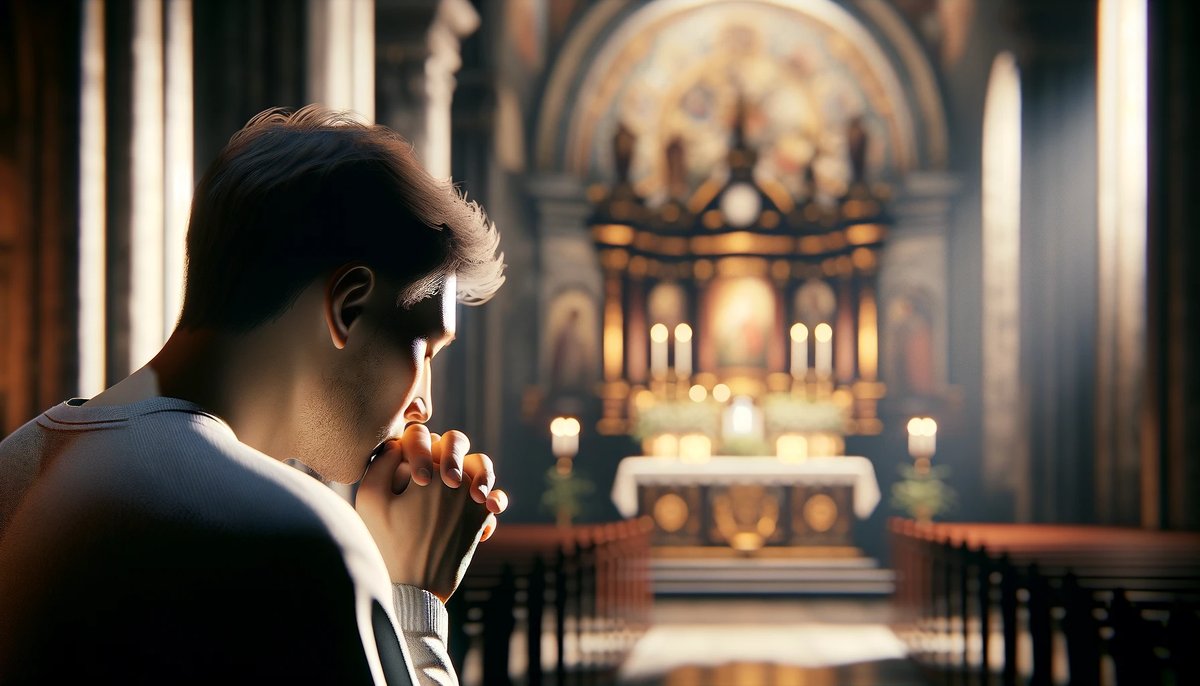Home>Theology and Spirituality>How To Pray In Catholicism


Theology and Spirituality
How To Pray In Catholicism
Published: February 18, 2024
Jason DeRose, Managing Editor at Christian.net, uses his expertise in religion and journalism to deepen understanding of faith's societal impacts. His editorial leadership, coupled with a strong academic background, enriches the platform’s diverse content, earning him recognition in both journalism and religious circles.
Learn the significance of prayer in Catholicism and discover the theological and spiritual aspects of this essential practice. Explore the rich tradition of Catholic prayer.
(Many of the links in this article redirect to a specific reviewed product. Your purchase of these products through affiliate links helps to generate commission for Christian.net, at no extra cost. Learn more)
Table of Contents
- Introduction
- The Importance of Prayer in Catholicism
- Understanding the Different Types of Catholic Prayers
- The Significance of the Sign of the Cross
- The Role of the Rosary in Catholic Prayer
- The Our Father: The Most Important Catholic Prayer
- The Hail Mary: A Common Catholic Prayer
- Other Traditional Catholic Prayers
- The Importance of Personal Prayer in Catholicism
- Conclusion
Introduction
Prayer is a fundamental aspect of Catholicism, serving as a means of communication with God and a way to deepen one's faith. It is a practice that has been integral to the Catholic tradition for centuries, offering believers a way to express gratitude, seek guidance, and find solace in times of need. The act of prayer is deeply intertwined with the spiritual journey of Catholics, providing a channel through which they can connect with the divine and nurture their relationship with God.
In this comprehensive guide, we will delve into the multifaceted world of Catholic prayer, exploring its various forms, significance, and impact on the lives of believers. From traditional prayers that have been passed down through generations to the personal and intimate conversations with God, prayer holds a central place in the hearts of Catholics around the world. Join us as we embark on a journey to understand the rich tapestry of Catholic prayer and its profound influence on the faithful.
Read more: How To Pray During Lent
The Importance of Prayer in Catholicism
Prayer is the cornerstone of Catholicism, permeating every aspect of the faith and serving as a vital means of spiritual connection with the divine. It is through prayer that Catholics express their devotion, seek guidance, and find solace in the presence of God. The significance of prayer in Catholicism extends beyond mere ritualistic practice; it is a profound expression of faith and a pathway to deepening one's relationship with God.
At the heart of Catholic belief is the understanding that prayer is a direct line of communication with the divine. Through prayer, Catholics offer their praises, confess their sins, and present their supplications to God. It is a sacred dialogue that transcends the earthly realm, allowing believers to connect with the spiritual realm and seek divine intervention in their lives.
Furthermore, prayer in Catholicism is not confined to formal gatherings or structured liturgies. It is a deeply personal and intimate practice that permeates the daily lives of believers. Whether in moments of joy, sorrow, or uncertainty, Catholics turn to prayer as a source of strength and solace. This intimate connection with God through prayer fosters a sense of spiritual resilience and fortitude, enabling believers to navigate life's challenges with faith and hope.
Moreover, the importance of prayer in Catholicism is underscored by its role in fostering a sense of communal unity among believers. Through collective prayer, such as the liturgy of the Mass, Catholics come together as a community to worship, reflect, and seek spiritual nourishment. This communal aspect of prayer reinforces the bonds of fellowship and solidarity among believers, creating a shared sense of devotion and purpose within the faith community.
In essence, the importance of prayer in Catholicism cannot be overstated. It is a transformative practice that shapes the spiritual landscape of believers, offering a channel through which they can express their faith, seek divine guidance, and find comfort in the presence of God. As such, prayer stands as a cornerstone of Catholic devotion, enriching the lives of believers and nurturing their profound connection with the divine.
Understanding the Different Types of Catholic Prayers
Catholicism encompasses a rich tapestry of prayers, each with its own unique significance and purpose. These prayers serve as a means for believers to express their devotion, seek intercession, and engage in spiritual reflection. Understanding the different types of Catholic prayers provides insight into the diverse ways in which believers connect with the divine and nurture their faith.
1. Liturgical Prayers:
Liturgical prayers form an integral part of the Catholic worship experience. These prayers are formalized within the context of the Mass and other sacramental rites, following a structured format that aligns with the liturgical calendar. Examples of liturgical prayers include the Gloria, the Sanctus, and the Agnus Dei, each holding a specific place within the order of the Mass.
2. Devotional Prayers:
Devotional prayers are expressions of personal piety and devotion, often centered on specific aspects of Catholic faith, such as the veneration of saints, the adoration of the Blessed Sacrament, or the recitation of particular prayers for specific intentions. The Rosary, the Divine Mercy Chaplet, and the Stations of the Cross are prominent examples of devotional prayers that hold deep significance for Catholics.
Read more: How To Pray In The Baptist Church
3. Vocal Prayers:
Vocal prayers involve the spoken or sung expression of prayer, often following established formulas or texts. These prayers may be recited individually or collectively, serving as a means of uniting believers in common devotion. The Our Father, the Hail Mary, and the Apostles' Creed are quintessential examples of vocal prayers that hold a central place in Catholic tradition.
4. Contemplative Prayers:
Contemplative prayers emphasize silent reflection, interior meditation, and the cultivation of a deep, personal connection with God. These prayers invite believers to enter into a state of profound spiritual communion, transcending verbal expression and embracing the contemplation of divine mysteries. The practice of contemplative prayer aligns with the rich tradition of Catholic mysticism and spiritual introspection.
5. Intercessory Prayers:
Intercessory prayers involve the act of petitioning on behalf of others, seeking divine intervention and grace for specific needs, concerns, or individuals. Catholics engage in intercessory prayers to invoke the intercession of saints, seek healing for the sick, and offer supplications for the well-being of others, reflecting the communal and compassionate nature of Catholic spirituality.
Understanding the diverse array of Catholic prayers underscores the multifaceted nature of Catholic devotion and the rich tapestry of spiritual practices that define the faith. Each type of prayer offers believers a unique avenue for expressing their faith, seeking spiritual nourishment, and fostering a deeper connection with the divine.
The Significance of the Sign of the Cross
The Sign of the Cross holds profound significance within the Catholic tradition, serving as a visible and tactile expression of faith and devotion. This sacred gesture is imbued with rich symbolism and theological meaning, encapsulating the core tenets of Catholic belief and serving as a potent reminder of the redemptive power of Christ's sacrifice.
When Catholics make the Sign of the Cross, they invoke the presence of the Holy Trinity – the Father, the Son, and the Holy Spirit. The gesture begins with the touch of the fingertips to the forehead, symbolizing the acknowledgment of God the Father, from whom all blessings and wisdom flow. This initial movement is accompanied by the words, "In the name of the Father."
The hand then moves to the chest, representing the recognition of the Son, Jesus Christ, whose sacrifice and resurrection form the cornerstone of the Christian faith. As the hand touches the chest, the words, "and of the Son," are spoken, affirming the central role of Christ in the salvation of humanity.
Finally, the hand moves from left shoulder to right shoulder, signifying the invocation of the Holy Spirit, the divine advocate and source of spiritual empowerment. This action is accompanied by the words, "and of the Holy Spirit," affirming the presence and guidance of the Holy Spirit in the life of the believer.
The Sign of the Cross also serves as a tangible expression of protection and blessing. By tracing the sign on oneself, Catholics invoke the divine presence and seek the safeguarding of their thoughts, words, and actions under the grace of the Holy Trinity. It is a gesture of spiritual fortification, a reminder of Christ's victory over sin and death, and a symbol of the believer's identity as a child of God.
Moreover, the Sign of the Cross is deeply intertwined with the sacramental life of Catholics. It is a ritual gesture performed at key moments of prayer, worship, and sacramental rites, such as the beginning and end of personal prayers, the reception of the Eucharist, and the invocation of blessings. In these instances, the Sign of the Cross serves as a visible expression of faith, underscoring the sacred nature of the moment and the believer's participation in the redemptive mysteries of the faith.
In essence, the Sign of the Cross stands as a powerful embodiment of Catholic faith, encapsulating the core beliefs of the Holy Trinity, the redemptive work of Christ, and the transformative presence of the Holy Spirit. It is a timeless symbol of divine love, protection, and grace, woven into the fabric of Catholic spirituality and embraced as a tangible expression of faith by believers around the world.
The Role of the Rosary in Catholic Prayer
The Rosary holds a revered place in Catholic prayer, serving as a profound and multifaceted devotional practice that encapsulates the essence of Catholic spirituality. This timeless prayer form intertwines vocal, meditative, and contemplative elements, offering believers a transformative journey through the mysteries of the faith.
At its core, the Rosary is a Christocentric prayer, centering on the life, ministry, and redemptive work of Jesus Christ. Comprised of repetitive sequences of prayers, including the Our Father, the Hail Mary, and the Glory Be, the Rosary invites believers to immerse themselves in the contemplation of key moments in the life of Christ, known as the Joyful, Sorrowful, Glorious, and Luminous mysteries. Each set of mysteries provides a spiritual tableau, inviting believers to reflect on the profound truths of the Christian faith and the salvific mission of Christ.
The rhythmic recitation of the prayers, coupled with the meditative reflection on the mysteries, creates a sacred rhythm that fosters a deep sense of spiritual communion and contemplation. As Catholics engage in the Rosary, they embark on a spiritual pilgrimage, journeying through the annunciation, the crucifixion, the resurrection, and the luminous manifestations of Christ's presence. This prayerful odyssey serves as a means of entering into the sacred drama of salvation history, embracing the transformative power of Christ's love and mercy.
Moreover, the Rosary is a prayer of intercession, invoking the maternal intercession of the Blessed Virgin Mary. As believers recite the Hail Mary, they turn to Mary, the Mother of God, seeking her prayers and guidance in their spiritual journey. The Rosary encapsulates the profound Marian devotion within Catholicism, underscoring Mary's role as the exemplar of faith and the compassionate advocate for all believers.
The Rosary also serves as a source of spiritual solace and strength, offering believers a tangible means of finding peace and consolation in times of trial and tribulation. Through the repetitive rhythm of the prayers and the contemplation of the mysteries, Catholics find a refuge in the loving embrace of Christ and Mary, experiencing a profound sense of spiritual renewal and fortitude.
In essence, the Rosary stands as a timeless and cherished prayer form within Catholicism, weaving together elements of vocal prayer, meditation, and intercession into a rich tapestry of spiritual devotion. It is a prayer that transcends time and space, inviting believers to immerse themselves in the transformative mysteries of the faith and find solace in the loving presence of Christ and Mary.
The Our Father: The Most Important Catholic Prayer
The Our Father, also known as the Lord's Prayer, stands as a cornerstone of Catholic devotion, revered as the most significant and universal prayer within the Christian tradition. Its profound significance is underscored by its origin as the prayer taught by Jesus himself, as recounted in the Gospels of Matthew and Luke. This prayer encapsulates the essence of Christian faith, serving as a timeless expression of adoration, supplication, and surrender to the divine will.
At the heart of the Our Father lies a profound acknowledgment of God as the loving and providential Father of all humanity. The prayer begins with the invocation, "Our Father, who art in heaven," affirming the intimate and familial relationship between God and His children. This opening address establishes a sense of reverence, trust, and filial dependence on the benevolent care of the heavenly Father.
The subsequent petitions within the Our Father encompass a range of spiritual and existential concerns, reflecting the universal aspirations and needs of humanity. From the hallowing of God's name and the coming of His kingdom to the supplication for daily sustenance and the forgiveness of sins, each petition encapsulates the fundamental dimensions of human existence and the longing for divine grace and mercy.
Moreover, the Our Father embodies the spirit of communal solidarity and intercession, as it is recited collectively by believers in various liturgical and devotional settings. This communal dimension underscores the shared identity of believers as members of the body of Christ, united in their aspirations for spiritual fulfillment and divine communion.
The Our Father also serves as a blueprint for the Christian life, encapsulating the core values of forgiveness, humility, trust, and reliance on God's providence. As believers recite this prayer, they are reminded of their call to embody the virtues of compassion, reconciliation, and fidelity to God's will in their daily lives.
In essence, the Our Father stands as a timeless testament to the enduring significance of prayer in the life of every believer. Its universal appeal, profound theological depth, and transformative power make it a cherished and indispensable prayer within the Catholic tradition, guiding believers on their spiritual journey and nurturing their profound connection with the divine.
The Hail Mary: A Common Catholic Prayer
The Hail Mary stands as one of the most beloved and widely recited prayers in the Catholic tradition, embodying a profound expression of devotion to the Blessed Virgin Mary and a timeless invocation of her intercessory role in the lives of believers. This cherished prayer encapsulates the essence of Marian piety and serves as a poignant reminder of Mary's central place in the Christian narrative.
The Hail Mary prayer is rooted in the biblical accounts of the Annunciation, where the angel Gabriel appeared to Mary, announcing that she would conceive and give birth to Jesus, the Son of God. The prayer begins with the angelic salutation, "Hail Mary, full of grace, the Lord is with thee," echoing the words spoken by Gabriel as he heralded the divine favor bestowed upon Mary. This opening salutation affirms Mary's unique role in salvation history and her singular grace as the Mother of God.
The subsequent petition, "Blessed art thou among women, and blessed is the fruit of thy womb, Jesus," underscores the reverence and adoration accorded to Mary as the chosen vessel through which the Incarnation took place. It acknowledges her blessedness and the sanctity of her divine motherhood, affirming her exalted status within the Christian faith.
The concluding plea, "Holy Mary, Mother of God, pray for us sinners, now and at the hour of our death," encapsulates the heart of the Hail Mary prayer – the invocation of Mary's maternal intercession on behalf of all believers. This supplication reflects the profound trust and confidence that Catholics place in Mary's compassionate advocacy, seeking her prayers for spiritual guidance, protection, and grace, especially in the hour of death.
The Hail Mary prayer also embodies the spirit of communal devotion, as it is recited collectively by believers in various liturgical, devotional, and personal settings. This communal dimension underscores Mary's universal maternal care for all humanity, uniting believers in their shared reverence for her role as the Mother of God and the compassionate advocate for all who call upon her name.
In essence, the Hail Mary prayer stands as a timeless testament to the enduring significance of Mary's intercessory role in the lives of believers. Its profound depth of devotion, universal appeal, and transformative power make it a cherished and indispensable prayer within the Catholic tradition, nurturing believers' profound connection with the Blessed Virgin Mary and her maternal care.
Other Traditional Catholic Prayers
In addition to the Our Father and the Hail Mary, traditional Catholic prayers encompass a rich tapestry of devotional expressions that have been cherished by believers for centuries. These prayers, steeped in sacred tradition and theological significance, serve as pillars of spiritual nourishment and sources of profound solace for Catholics around the world.
One such prayer is the Apostles' Creed, a succinct yet comprehensive statement of faith that encapsulates the core tenets of Christian belief. Recited during the liturgy and personal devotions, the Apostles' Creed affirms the foundational doctrines of the Trinity, the Incarnation, the redemptive work of Christ, and the hope of eternal life. It stands as a timeless profession of faith, uniting believers in their shared adherence to the central truths of the Christian gospel.
The Act of Contrition holds a significant place in the sacrament of reconciliation, offering believers a means of expressing genuine sorrow for their sins and seeking God's forgiveness. This heartfelt prayer acknowledges the reality of human frailty and the need for divine mercy, inviting believers to turn to God with contrite hearts and a sincere desire for spiritual renewal.
The Prayer to St. Michael the Archangel embodies the rich tradition of invoking the intercession and protection of the heavenly hosts. This powerful prayer calls upon the archangel Michael, the defender of the faithful, to safeguard believers in their spiritual battles and shield them from the forces of darkness. It reflects the profound spiritual warfare inherent in the Christian journey and the reliance on angelic assistance in the face of adversity.
The Prayer of St. Francis, also known as the Peace Prayer, resonates deeply with believers seeking to embody the virtues of compassion, forgiveness, and selflessness. Attributed to St. Francis of Assisi, this prayer encapsulates the transformative spirit of Christian love, inviting believers to become instruments of peace, hope, and divine consolation in a world marked by discord and suffering.
The Memorare, a prayer of profound trust in the intercessory power of the Blessed Virgin Mary, holds a cherished place in Catholic devotion. This prayer invokes Mary's maternal care and advocacy, affirming her role as the refuge of sinners and the dispenser of God's graces. It stands as a poignant expression of confidence in Mary's compassionate intercession and her unfailing assistance in times of spiritual need.
In essence, these traditional Catholic prayers form a mosaic of spiritual devotion, uniting believers in their shared reverence for the core doctrines of the faith, the pursuit of reconciliation and forgiveness, and the invocation of heavenly intercession. They stand as timeless expressions of faith, hope, and spiritual resilience, nurturing the profound connection of believers with the divine and enriching the tapestry of Catholic spirituality.
The Importance of Personal Prayer in Catholicism
Personal prayer holds profound significance within the framework of Catholic spirituality, serving as a deeply intimate and transformative practice that nurtures the individual's relationship with God. While communal worship and liturgical prayers form integral aspects of Catholic devotion, personal prayer offers believers a unique avenue for cultivating a deep and personal connection with the divine.
At the heart of personal prayer in Catholicism lies the invitation for believers to engage in a direct and unfiltered dialogue with God. It provides a sacred space for individuals to express their innermost thoughts, emotions, and aspirations, laying bare their joys, sorrows, hopes, and fears before the loving presence of God. This intimate form of communication fosters a sense of spiritual authenticity and vulnerability, allowing believers to approach God with openness and sincerity.
Moreover, personal prayer serves as a means of spiritual nourishment and renewal, offering believers a sanctuary for seeking solace, guidance, and strength in the midst of life's challenges. It provides a space for reflection, introspection, and contemplation, enabling individuals to find clarity, peace, and resilience in the embrace of God's love and grace. Through personal prayer, Catholics draw upon the wellspring of divine consolation, finding reassurance in the knowledge that they are held in the compassionate gaze of the heavenly Father.
Additionally, personal prayer in Catholicism is a pathway to spiritual growth and transformation. It serves as a catalyst for deepening one's faith, fostering a sense of spiritual maturity, and nurturing a profound awareness of God's presence in everyday life. Through the practice of personal prayer, believers embark on a journey of self-discovery and spiritual enrichment, encountering the transformative power of divine love and grace in their innermost being.
Furthermore, personal prayer engenders a sense of personal responsibility and agency in the cultivation of one's spiritual life. It invites believers to take ownership of their faith journey, to seek God's presence in the quiet moments of solitude, and to actively participate in the ongoing dialogue with the divine. This sense of personal investment in prayer fosters a deepening of faith, a strengthening of spiritual resolve, and a heightened awareness of God's active presence in the tapestry of daily life.
In essence, personal prayer stands as a cornerstone of Catholic spirituality, offering believers a sacred space for intimacy, renewal, growth, and personal agency in their relationship with God. It is a practice that transcends the boundaries of ritual and tradition, inviting individuals to encounter the divine in the depths of their being and to find solace, strength, and transformation in the loving embrace of God.
Conclusion
In conclusion, the practice of prayer in Catholicism is a profound and multifaceted expression of faith, serving as a vital conduit for spiritual connection, communal worship, and personal devotion. From the rich tapestry of traditional prayers to the intimate dialogue of personal prayer, Catholicism embraces a diverse array of prayer forms that encapsulate the essence of the faith and nurture the profound connection of believers with the divine.
Throughout this exploration, we have delved into the significance of prayer in Catholicism, recognizing it as a transformative practice that shapes the spiritual landscape of believers, offering a channel through which they can express their faith, seek divine guidance, and find comfort in the presence of God. The communal aspect of prayer reinforces the bonds of fellowship and solidarity among believers, creating a shared sense of devotion and purpose within the faith community.
Understanding the different types of Catholic prayers has provided insight into the diverse ways in which believers connect with the divine and nurture their faith. From liturgical and devotional prayers to vocal, contemplative, and intercessory prayers, each form offers believers a unique avenue for expressing their faith, seeking spiritual nourishment, and fostering a deeper connection with the divine.
The significance of sacred gestures such as the Sign of the Cross and the profound role of prayers like the Our Father and the Hail Mary underscore the rich tapestry of Catholic devotion and the timeless expressions of faith that resonate deeply with believers across generations.
Moreover, the importance of personal prayer in Catholicism has been highlighted as a deeply intimate and transformative practice that nurtures the individual's relationship with God, offering a sanctuary for seeking solace, guidance, and strength in the midst of life's challenges.
In essence, the world of Catholic prayer is a testament to the enduring power of faith, the transformative nature of spiritual devotion, and the profound impact of prayer on the lives of believers. It stands as a timeless expression of reverence, trust, and communion with the divine, enriching the spiritual journey of Catholics and nurturing their profound connection with God.












